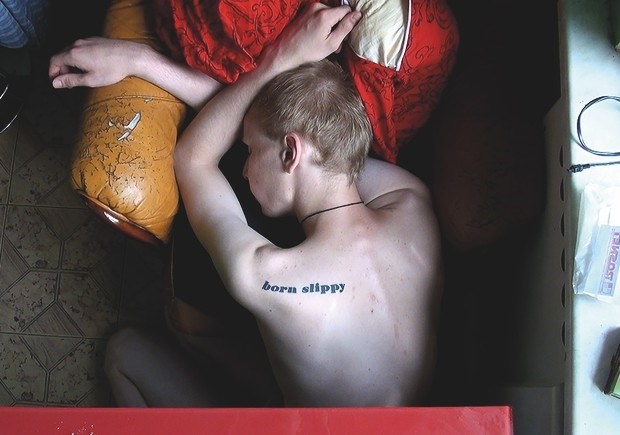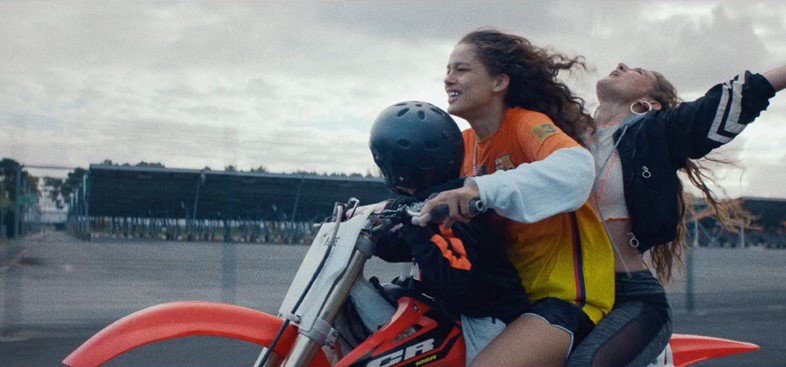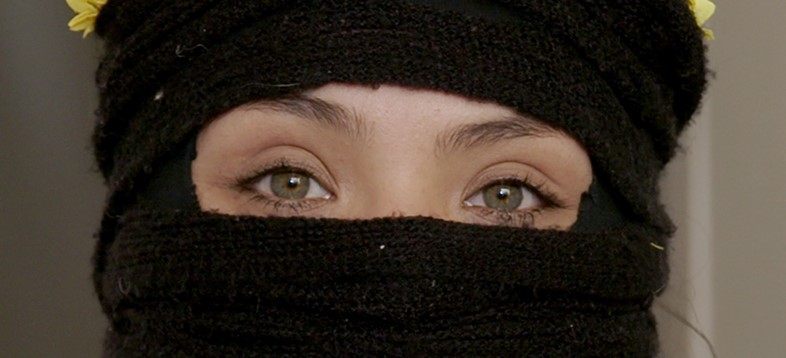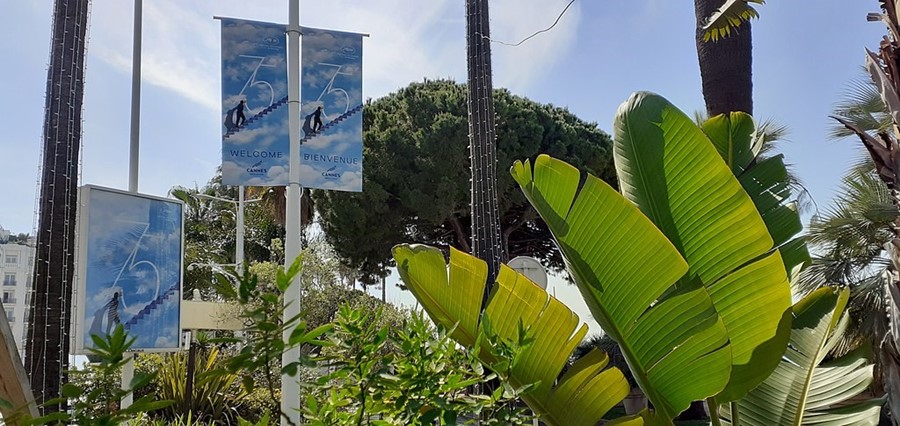Our guide to what was popping during the first week of the French film industry extravaganza, back in bacchanalian full swing after a low-key 2021
On the red carpet at Cannes last week, Tom Cruise flashed his pearly whites at a team of French fighter jets as they blazed a tricolore trail overhead for a screening of his new film, Top Gun: Maverick. At the previous day’s opening ceremony, President Zelenskyy delivered an impassioned address on the war in Ukraine over videolink, the French film industry having pledged its solidarity to the cause – now the oligarchs’ superyachts have all fled, of course – by banning Russian delegates from the event. Welcome to Cannes 2022, reality and unreality colliding in two very different blockbuster moments.
I’ve been fortunate enough to blag entry to the world’s biggest film festival for a few days and, as a Cannes virgin, it’s fair to say all this takes a bit of adjusting to. I’d been to the city once before, the autumn before Covid hit, and didn’t care for it much: despite the beauty of its natural setting, it felt cold, void of life, manifestly not for the likes of me. But the festival – now restored to full ludicrousness after 2021’s ban-the-bisous affair – is a vision of pure surreality, a teeming bacchanal of A-listers, B-listers, photographers, hacks, tuxedo-clad producers strutting about the place as if they were James Bond, and assorted PR flim-flam. (“Oh, you’ve been with Xavier Dolan? Tell him it’s way past his bedtime!” one guy hollers to his mate a few rows back at a screening – he can’t be much older than 12.) Still, once you learn to let go, Cannes is undeniably a laugh – and who would begrudge people indulging in a bit of razzle-dazzle after the two years we’ve had? My own personal moment of surrender comes during a brief moment’s inattention on a zebra crossing, when I look up to see the literal Batmobile comes to a halt in front of me. What is it even doing there? Do you really have to ask?

But let’s talk business, my times at Cannes being but brief. I decide to take the plunge with How to Save a Dead Friend’s Life, a Russian documentary screening as part of the festival’s Acid Film strand. Harrowing yet undeniably full of life and the kind of gallows humour that comes naturally to the habitually depressed, it’s a doomed love story between teenager Marusya, in what she imagines to be the last year of her life, and Kimi, a kindred spirit who shares her intimate knowledge of Joy Division’s back catalogue. Lovingly assembled from old home footage and newsreel clips by its co-star and director, Marusya Syroechkovskaya, the film doubles as a fond farewell to a friend and a deeply affecting portrayal of depression and addiction amid the steadily darkening backdrop of life in 21st-century Russia.
I chase that down with a screening of Rodeo, a red-hot favourite in this year’s Un Certain Regard competition. It’s a terrifically stylish debut from director Lola Quivoron, a heist movie of sorts that immerses us in the French subculture of stunt bike riding. Tough, enigmatic and suffused with the kind of shotgun feminism increasingly being brought to the screen by French directors like Julia Ducournau (Titane) and Coralie Fargeat (Revenge), it’s lit up by a vital performance from first-timer Julie Ledru as the reckless young girl who sets out to infiltrate this male-dominated world.

Next up is Armageddon Time, James Gray’s autobiographical story of a Jewish kid growing up in the hothouse atmosphere of early-80s New York. When Paul (Michael Banks Repeta) gets caught smoking weed with his Black BFF Johnny (Jaylin Webb) at school, his wealthy grandparents agree to send him to a private school in Queens, where none other than Fred Trump, racist landlord and father to future Prez Donald, is governor. It’s a deeply personal work from a director who has brought deft auteurish touches to big-budget genre fare like Ad Astra and Lost City of Z, but the white-liberal guilt that powers the film feels somehow misplaced to me, suggesting the seeds of Trumpism lay in the racial battlegrounds of 80s NYC rather than decades of neoliberal policy laying waste to the country’s blue-collar communities.
On Friday I head to the Salle Debussy for a film called Plan 75, directed by Chie Hayakawa, about a Japan of the near future where elderly citizens are encouraged to sign up for a state-assisted suicide in order to revive the country’s tanking economy. With a top-line like that, you might be expecting a kind of OAP’s Squid Game or Battle Royale, but it’s the kindness that kills in this sober-minded sci-fi riff on Japan’s ageing population problem, its characters observing social niceties even as the full horror of the programme sinks in. Still, it’s hard to shake the feeling that Hayakawa’s film creeps up on its subject matter almost too politely – it’s a story that unsettles, without ever really getting under your skin.

In My Imaginary Country, doc-maker Patricio Guzmán gives a gripping account of the civil unrest that swept through Chile in 2019, leading to the biggest protests in the country’s history and the drafting of a new political constitution. Guzmán made his name chronicling the rise of Salvadore Allende and his subsequent toppling by General Pinochet in a CIA-backed coup in the 1970s; nearly thirty years after the dictator’s downfall, he finds Chilean democracy in trouble once more, this time thanks to plummeting living standards and an out-of-touch political elite (sound familiar?). This time, it was women at the forefront of the political earthquake, a fact that Guzmán acknowledges by speaking exclusively to the movement’s many female protagonists, whose incandescent rage is matched only by their eloquence and clear-eyed optimism for the future: “It’s as if the soul had returned to the body,” as one protester says in the film.
OK, time for one last hurrah before heading home: Aftersun, another avowedly personal work from first-time director Charlotte Wells, tells the story of a young girl on holiday with her beloved father in Turkey at the end of the 90s. The ‘twist’ is that dad is clearly depressed, a fact that the girl is only just beginning to wrap her head around, and the trip is refracted through the girl’s efforts to remember it as an adult somewhere in the here and now. All package-holiday details from the era are present and hilariously on-point, from the Macarena-dancing dads to the arcade-game encounters with other kids, and both father and daughter are beautifully portrayed by Normal People star Paul Mescal and newcomer Frankie Corro. It culminates in a fantastically realised – and unbearably sad – dance between the two that reduces the whole audience to tears. Cue a standing ovation for the visibly emotional director and cast, who have created something very special here, and a welcome reminder of the best thing about film festivals: the chance to witness first-hand the heart and soul that go into films by the people that make them. What a way to say goodbye.
